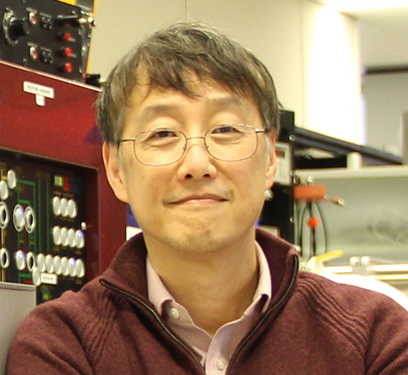Philip Kim - Physics in flatland: Searching for new quantum materials for emerging technologies
Talk details
- Date: 22 October 2023
- 1 p.m. (ET)
- Location: Zoom
- Video recording
Talk abstract
From the speaker:
“Quantum physics has reshaped our understanding of materials and provided the opportunity to design materials for novel device applications. For example, superconductivity, an emergent quantum phenomenon in which electrons move without dissipating energy, has been exploited for devices that enable quantum computing and communications. In addition, modern electronics rely heavily on technology that confines electrons in the interfacial atomic layers, where the electrons move in an effective two-dimensional (2D) space, a flatland. The unique properties of these low-dimensional material systems are generally understood by considering enhanced quantum effects. In recent years, scientists have discovered that they can stack atomically thin 2D quantum materials to create engineered materials with a wide variety of electronic and optical properties. In this talk, we will discuss several research efforts to realize emergent physical phenomena in stacked atomically thin layered materials and possible applications based on these materials.”
Presenter
Philip Kim
Professor Philip Kim received his bachelor’s degree in physics at Seoul National University in 1990 and received his PhD in Applied Physics from Harvard University in 1999. He was Miller Postdoctoral Fellow in Physics from University of California, Berkeley during 1999-2001. He joined the Department of Physics at Columbia University as a faculty member during 2002-2014. Since 2014, he has held a post at Harvard University, where he is a professor of physics and applied physics.
The focus of Kim’s group research is the mesoscopic investigation of transport phenomena, particularly, electric, thermal, and thermoelectrical properties of low dimensional nanoscale materials. These materials include carbon nanotubes, organic and inorganic nanowires, 2-dimensional mesoscopic single crystals, and single organic molecules. Kim has also received numerous honors and awards, including: the Benjamin Franklin Medal in Physics (2023); Tomassoni-Chisesi Prizes (2018); the Oliver E. Buckley Prize, American Physical Society (2014); the Dresden Barkhausen Award (2012); and the Ho-Am Science Prize (2008). He is an elected member of the National Science of Academy (2023) and the American Academy of Arts and Science (2020). He has graduated 21 PhD students and trained 32 postdoctoral fellows and has published more than 250 papers.


